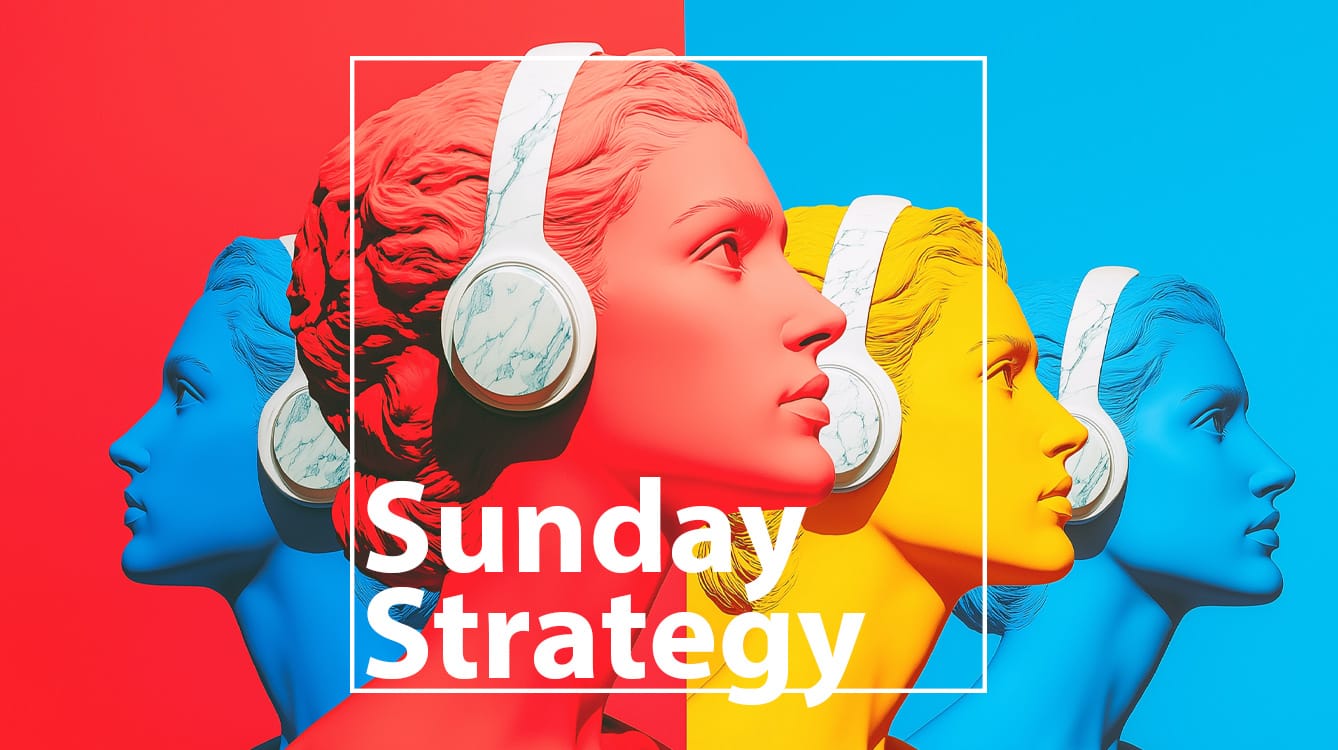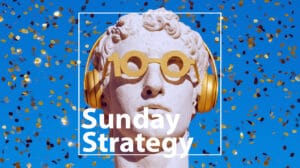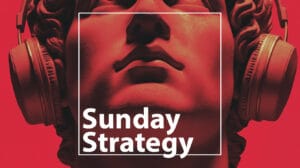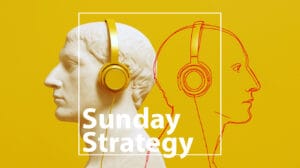In this issue of Sunday Strategy, we look at five stories to think about next week, including: American Tourism’s Looming Crisis, Meta’s Streisand Moment, Brands Losing Their Soul, Expanding Beyond the “Manosphere” and VR in Prison.
In addition, we have ads from: KFC, Duke Cannon, State Farm and Lewis Hamilton. If you’d rather listen to the issue, check out the episode of our podcast below:
// Five Stories of the Week:
1.) American Tourism On a Cliff Edge?
Tesla sales are falling fast enough that the brand had and impromptu commercial on the White House lawn. Canadian companies are boycotting American products. European artists are cancelling US tours. As US tariffs increase, delay and change – a trade war is slowly playing out in both the treasury and in businesses around the world. It’s not an easy time to be an American brand.
However, as new travel restrictions are proposed – one area that has been less prominent looks to join the fray – tourism. A December YouGov study showed that net travel intention to the US declined by 13% after Trump’s election, though amongst passport holders the net decline was 7%. Only 18% of respondents across 20 countries said they were less likely to go to the US based on the election. Though buzz and impression of the US as a destination is dropping, lower funnel intent holds steady – showing that, so far, impression and action are separate.
However, travel bans look to make the process of travelling look more difficult, negatively impacting the perception of the travel experience. Female travellers and those from Canada and Mexico were much less likely to say they would travel to the US than other countries – due to policies and news directly affecting them. A travel ban evokes a sense of chaos for many at airports and points of entry, as well as discrimination. With these new proposals, are we likely to see a slump in American tourism from abroad that an uncertain American consumer can’t help fix domestically?
2.) Meta’s Streisand Moment.
When does the Streisand effect not count? Famously, singer Barbra Streisand’s 2003 efforts to block Google Maps from showing a satellite image of her home drew more attention than it would ever have had quietly presented on the platform. The unintended consequence coined the term the ‘Streisand Effect’ and served as a warning for those considering unintended consequences in PR.
Now, as Meta aims to stop a book, ‘Careless People’, from an ex-employee laying out claims of a toxic workplace – are we poised to see their Streisand moment? Probably not. Streisand’s case tapped into ‘psychological reactance’, a concept where we seek out information that seems to be hidden and resist decisions perceived to limit our behavioral freedoms. Whereas I don’t care about Barbara Streisand’s house, don’t tell me I can’t view it. Does the Meta tell-all have enough new information that I feel I’m losing something?
As Meta’s founder polls at levels near or below Elon Musk in the US, do I feel a freedom to find out something new is being limited, or is this just confirmation of what many Americans already believe? This distinction may be what makes this either corporate damage control or Meta’s Streisand moment.
3.) What Happens When a Brand Loses Its ‘Soul’.
Can we pinpoint the moment a brand ‘jumps the shark’ or ‘loses its soul’? With time it’s easier, but often in the moment, it becomes imperceptible. The straw that breaks a brand’s back isn’t usually clear and isolated, coming instead as a stream of decisions that only become clear afterwards.
However, for brands that have much loved aspects, the loss of these can be an unusually clear turning point that a brand needs to react to or risk losing what makes it special. Southwest Airlines decision to ditch its ‘bags fly free’ policy, after also ditching assigned seating, feels like it could be one of these. Similar to Costco’s famous $1.50 hotdogs, which the CEO says can’t change, Southwest built a brand on product features. So when these change, does the brand lose its soul? Brands have to adapt, but keeping what makes it special is necessary. When a part of its soul like this is lost, it has to be replaced by something equally valuable.
4.) Expanding Beyond the “Mainstream Manosphere”.
2024’s US Presidential election shined a spotlight on the ‘Manosphere’ in its wake. The ecosystem of male, predominantly right wing podcasters and social media personalities, often typified by Joe Rogan – spoke to the continuing fragmentation of media and the decline of monolithic traditional media. While the hype cycle on this has peaked, we’re now faced with an expansion beyond the ‘manosphere’.
Predictably, where attention goes, content follows. So, as the WSJ highlights, conversations about the lack of engagement from liberal personalities with the ‘manosphere’, has turned to an emergence of popular podcasts across a wider share of the political spectrum. Additionally, women have built a more distinct alternative to male led media properties.
The expansion across political and gender lines shows that greater attention has broadened this new media ecosystem. In its wake, it also left the ‘manosphere’ in a unique role, often as the ‘legacy’ media property. From defending audiences to press accreditation in the Trump whitehouse, ‘manosphere’ properties may face challenges ironically shared by the more traditional media they were accused of attacking last year.
5.) Does VR Belong in Prison?
The mention of VR within the prison system is likely to conjure scifi-esque visions along the lines of Brazil or 1984. However, with 122k prisoners in America in solitary confinement in the United States right now, in a practice that often isolates them for up to 22 hours a day, ways to mitigate the documented damage it causes are needed. In California, this has turned to VR to try and prepare prisoners in solitary for what will happen when they emerge. The organization Creative Acts has launched an initiative that gives prisoners access to 20 Oculus Rift headsets, with programming that is both escapist (a rickshaw ride in Thailand) and preparatory (job interviews, first days out of prison).
The concerns that this makes an inhumane practice acceptable aside, the program has shown the value of vicarious learning and preparation for a life outside prison – with infractions during the program decreasing from 735 to 1. Whereas the mind was forced to find an escape avenue on its own previously, as long as this isolation does occur – this shows how technology can help augment what humans are already seeking out.
// Ads You Might Have Missed:
1.) ‘All Hail Gravy’ – KFC:
KFC UK and Ireland has launched the second ad in their three part ‘Believe in Chicken’ campaign, this time focused on the Gravy. “All Hail Gravy” takes a beige perspective on Midsommar, featuring a man lost in the woods until he’s found by a chicken cult with a golden egg and subsequently baptized in a lake of gravy – becoming a chicken wing. Surprisingly, that makes more sense writing about it than it does watching it. It’s the A24 version of a fast food cult ad that contrasts with Arby’s potato cake cult ad of 2024.
So if you’re wondering what’s going on, you’re not alone. However, KFC’s “Believe in Chicken” campaign aims to tap into that. Their first ad outlines the campaign’s premise, featuring people chicken dancing, and then worshipping a chicken, aiming to glibly show the world has gone mad – but chicken is still here for you. While the totality of it pays off this premise, do those who only see the ode to Gravy get the same outtake? Do they need to? Perhaps each still does weird intrigue in a weirder world on their own – in such a way that those not steeped in KFC’s chicken cult still get a sense of intrigue. For a sector where top of mind awareness is the leader, these look like they’ll recruit followers.
2.) ‘Bateman vs Batman’ – State Farm:
State Farm’s latest ad was originally planned for the Super Bowl before pivoting to the NCAA Men’s Tournament. Due to the Los Angeles wildfires, the brand chose to focus on supporting customers during the Big Game rather than advertising.
This shift brings Super Bowl-caliber intellectual property and celebrity power together to demonstrate that not all protection is equal—and does so without featuring any athletes. The ad stars Jason Bateman as a limited “Batman” replacement called “Bateman,” alongside Jake the mascot, SZA, Jordan Howlett, and Kai Cenat. This impressive star power helps overcome the challenge of being a basketball tournament ad with minimal basketball content.
By treating March Madness with Super Bowl-level production, State Farm breaks free from typical basketball advertising clichés that will soon saturate the market. This approach demonstrates that brands can participate in a cultural moment without completely leveraging its specific themes. However, success requires full commitment to the creative concept, as State Farm has done through influencer outreach, PR, and media initiatives—minimizing the risk of being overlooked in favor of messaging that naturally captures attention.
3.) ‘Un-NIL’ – Duke Cannon:
Soap brand Duke Cannon has expanded their ‘Earn Your Clean’ hard working / hard cleaning brand platform with a March Madness ad that is very basketball, but in an unexpected way. As NIL deals with players become more expensive, brands are beginning to use the NIL sponsorship concept as a foil to look at other elements of the team. Duke Cannon’s campaign has focused on becoming the official sponsor of the mascot of Iowa State’s basketball team. Beyond ads that feature the anonymous mascot, they’re also auctioning off ‘game used’ soap in a nod to used jerseys. The campaign shows how shining the spotlight on supporting members of the team isn’t just a good idea, it creates a unique space to activate in sport without the traditional costs or cliches.
https://www.youtube.com/watch?v=mR4uDqRzRUM
4.) ‘Another Dream Come True’ – Lewis Hamilton:
Lewis Hamilton’s switch to Ferrari’s F1 team has been met with lots of different content and brand activations, but none of them are more charming than this send up of the iconic valet scene from “Ferris Bueller’s Day Off’. Leveraging the original scenes and putting Lewis in the role of the valet that takes Cameron’s father’s 1961 Ferrari 250 GT California Spyder – Paramount Pictures and Hamilton remake the scene shot for shot. The content doesn’t just tap into the excitement around Hamilton’s team switch, it shows how multiple brands, IP and nostalgia can come together to make something playful and entertaining.
// Sunday Snippets
// Marketing & Advertising //
// Claussen pickles wants people to celebrate St. Patrick’s Day with pickle juice in their ‘Just the Brine’ product [Product]
// Yahoo celebrates those who never gave up that original email address with a snarky instagram post [Ads]
// Captain Morgan Sweet Chili Lime introduces itself with a synth track [Ads]
// Economic woes have hit incidental convenience store purchases hard (aside from Lottery Tickets) [Marketing]
// Google Deepmind launches their sequel to the “AlphaGo” documentary, “The Thinking Game” [AI]
// Louis Vuitton debuts signage and trophy trunk for their F1 partnership with the Australian Grand Prix [Sports]
// Pizza Hut has launched a charcuterie board [Food]
// Football club Sunderland aim to raise awareness of the climate crisis with a change to their club crest [Sustainability]
// IKEA continues their sleep fixation with a global report on how we sleep [Research]
// WAWA tops the list of most loved US gas station brands [Research]
// Technology & Media //
// Strategists investigate how AI integrates into their workflow in the latest ‘Think with Google’ video [AI]
// Bluesky have sold out of their iconic ‘A World Without Caesars’ t-shirt worn by the CEO at SXSW [Culture]
// TikTok releases research into how consumers approach ‘tent pole’ events. Short form video surprisingly, does well [Social Media]
// Reddit launches a suite of tools to help users create, including a ‘Pick a Community’ posting feature [Social Media]
// A software update is rumoured to add translation to Apple’s Airpods later this year [Technology]
// Reddit’s new policies to censure voters of banned content looks to challenge what made the network unique [Social Media]
// New research claims AI can get ‘anxious’ [AI]
// Metallica comes to the Apple Vision Pro [Music]
// Is the MLS’ deal with Apple holding the league back? One anonymous exec thinks so [Sports]
// Life & Culture //
// Long running series and potential documentary ‘Black Mirror’ has announced its 7th season launching in April [TV]
// In unintentional ‘Black Mirror’ style news, Netflix’s AI upscaling of a TV show leaves viewers a little freaked out [AI]
// Blanked studios launches a Lumon themed set of stationary inspired by the TV show Severance [TV]
// Manchester United has unveiled a new design for a stadium and the memes aren’t far behind [Sports]
// A boost for UK side hustles as the government raises the tax free income allowance to 3,000 pounds [Work]
// Multiple jobholder rates in the US are the highest they’ve been since 2009 [Work]
// The Bear Over Bachelor’s Degrees: Gen Z are turning to the kitchen over college [Work]
// The NFIB reports US small businesses are struggling to hire in greater levels [Work]
// New IPSOS research shows the Ukrainian people positively view the democratic legitimacy of their president and approve of his job [Research]
// Job security issues and economic uncertainty have tanked American vacation planning [Travel]
// Converse expands on the ‘sneaker loafer’ trend [Fashion]
// Is lifestyle coaching the new ‘asking your friends for advice’ [Culture]
// Is it still ‘Freaky Friday’ if it’s four people? A trailer for a sequel to Lindsay Lohan’s “Freaky Friday” has dropped [Movies]
// Until Next Sunday
As always, let me know what you think by email (dubose@newclassic.agency), website or on LinkedIn.
You can also listen to an audio summary and discussion of each week’s newsletter on Spotify. We’re also on TikTok!





